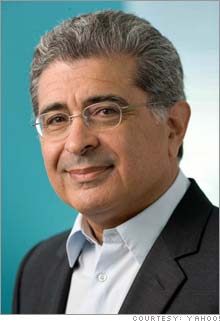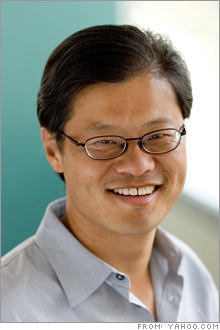Yahoo's woes run deeper than SemelInvestors welcome co-founder Jerry Yang as the new chief executive of the No. 2 search engine, but can he save Yahoo? Fortune's Adam Lashinsky weighs in.(Fortune Magazine) -- The market cheered Terry Semel's departure Monday as chief executive of Yahoo. When investors take a deep breath, however, they might realize that getting rid of just one guy may not actually cure the company's ills. Yahoo's stock rose 3 percent early in the day on rumors of Semel's departure and then rose nearly another 5 percent in after-market trading on the news. The stock changed hands after hours at around $29.50, still down 32 percent from the January 2006 price of $43 - the peak during Semel's tenure.
But are the changes at Yahoo enough? First, there is Semel's replacement, company co-founder Jerry Yang. The 38-year-old Yang hardly represents an injection of fresh blood, as Semel himself did when he was hired in 2001. As Rob Cox, of the Web site breakingviews.com, wrote wittingly of Yang's appointment: "He hasn't spent the past few years in an ashram. As a director, and, presumably, as chief Yahoo, he's been involved in Semel's strategic decisions." That's an understatement, actually. Yang has been a permanent presence at Yahoo (Charts, Fortune 500) for its entire history, preferring not to have an operating role but willing to play emissary to various Yahoo constituencies. That Yang hasn't been willing to step up until now certainly could be viewed as a sign that he's finally ready. But one wonders if simply watching first the zany Tim Koogle and then the Hollywood operator Semel has prepared Yang to be a chief executive of an 11,000-person company. Steve Jobs ran Apple (Charts, Fortune 500) before being fired and then returning. Bill Gates ran Microsoft (Charts, Fortune 500) for decades. Yang's entrepreneurial zeal, much praised in favorable press reviews Monday, is rather beside the point. Yahoo subtly drove home one salient point about Yang: He's an engineer. Google (Charts, Fortune 500) famously is run by engineers. Google has beaten the pants off Yahoo in the technology department. Yahoo hasn't been run by entrepreneurs. On the contrary, Semel, who increased Yahoo's presence in Los Angeles and hired the television executive Lloyd Braun (a culture clash from start to end), is an entertainment guy who surrounded himself with entertainment guys. (Will Semel acolytes Jeff Weiner and Toby Coppell, both promoted to new positions recently, stick around?) In announcing the move, Yahoo chose to quote the one director on its board with serious technology chops, former Cisco (Charts, Fortune 500) executive Ed Kozel. No word from supermarket magnate Ron Burkle or airline vet Gary Wilson or videogamer Bobby Kotick, the board's "presiding director." Message: Yahoo will get its technological house in order under its new engineer-CEO. It's also puzzling that investors ignored what essentially was a negative pre-announcement from Yahoo, which said Monday that second-quarter results would settle toward the low end of its previous projections. And for the worst of reasons: Weakness in display advertising, Yahoo's bread and butter business. The quarter is nearly over - it ends June 30 - so Yahoo left little mystery that relatively speaking, it wasn't a good one. So what will Jerry Yang actually do as CEO? He says he doesn't want to sell the company. Fair enough. Yahoo clearly wasn't interested in selling to Microsoft, and if it had been, deal-guy Semel would have gotten it done. Yang could clean house, but promoting former CFO Sue Decker to president is another sign that Yahoo plans to stay the course Semel charted. Had Yahoo's board not replaced Semel immediately, or had it named Yang an acting CEO, it's possible investors could have inferred that the company was planning a truly radical move, like killing Panama (the ad-search platform) and reverting to syndicating search ads from Google. That idea is blasphemy in Sunnyvale - huge acquisitions of Inktomi and Overture plus a massive investment in Panama would be wasted - but everyone knows it'd be an immediate shot in the arm for Yahoo. From my discussions with the dissatisfied foot soldiers - and a few officers - who've left Yahoo in recent months, one of the chief criticisms is that Yahoo is focusing so much energy and resources on search advertising that the rest of the business is starving. Decker in particular, a former Wall Street analyst who insists on delivering on bottom-line promises to investors isn't likely to reverse this trend. Last summer, just after the first time Yahoo's new ad-search platform was delayed, Yahoo held a one-day show-and-tell extravaganza at a swanky San Francisco hotel. The good times were right around the corner, Semel and his management team seemed to be saying. Benjamin Schachter, a UBS analyst who has been bullish on Yahoo's stock for a regrettably long time, wrote Monday night: "This move means that 2007 will be a turnaround year and we will not likely see the results until next year." |
Sponsors
|


